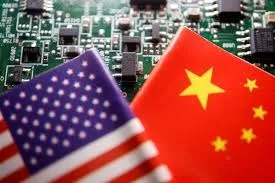Washington, D.C. — The U.S. Department of Commerce is weighing a potential rollback of previously granted export authorizations to leading semiconductor manufacturers Samsung Electronics, SK Hynix, and Taiwan Semiconductor Manufacturing Company (TSMC)—a move that could significantly complicate their operations at manufacturing facilities in mainland China, according to individuals familiar with the discussions.
While no final decision has been made, sources suggest the department is evaluating whether to rescind the Validated End User (VEU) status these companies were granted between 2023 and 2024. This designation has allowed them to receive U.S.-origin semiconductor equipment and technology for use in China without requiring individual export licenses.
The development marks a critical inflection point in the Biden administration’s evolving strategy toward safeguarding U.S. technology from potential strategic competitors, particularly as geopolitical frictions with China persist.
“There is currently no intention of deploying this tactic,” a White House official told reporters on condition of anonymity. “It's another tool we want in our toolbox in case either this agreement falls through or any other catalyst throws a wrench in bilateral relations.” The official clarified that the U.S. was merely “laying the groundwork” should the current trade détente between Washington and Beijing unravel, especially concerning the agreed flow of rare earth materials from China.
Despite the precautionary tone, the news had an immediate market impact. Shares of U.S.-based semiconductor equipment suppliers tumbled following an initial report by The Wall Street Journal on Friday. KLA Corp declined 2.4%, Lam Research fell 1.9%, and Applied Materials dropped 2%. In contrast, shares of Micron Technology, a key rival of Samsung and SK Hynix in the memory chip segment, rose by 1.5%.
A spokesperson for TSMC declined to comment on the potential policy shift. Samsung and SK Hynix did not respond to requests for comment. Likewise, the three U.S.-based equipment suppliers remained silent as of press time.
The VEU program, as described by the Commerce Department, facilitates “more easily, quickly, and reliably” the export of designated goods and technologies to vetted foreign manufacturers. It is seen as a vital mechanism for maintaining the global supply chain for advanced semiconductors while ensuring appropriate oversight.
The reconsideration of these authorizations comes in the wake of sweeping export controls introduced by the United States in October 2022, which restricted the shipment of high-end chipmaking tools to Chinese facilities. To mitigate disruption to allies' operations, firms like Samsung and SK Hynix were initially granted temporary waivers, followed by more formal VEU status.
Should the U.S. opt to revoke these permissions, foreign chipmakers could face significant operational hurdles in China, potentially accelerating a broader decoupling of the global semiconductor supply chain.




.png)
The opinions posted here do not belong to 🔰www.indiansdaily.com. The author is solely responsible for the opinions.
As per the IT policy of the Central Government, insults against an individual, community, religion or country, defamatory and inflammatory remarks, obscene and vulgar language are punishable offenses. Legal action will be taken for such expressions of opinion.